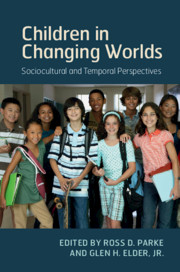Book contents
- Children in Changing Worlds
- Children in Changing Worlds
- Copyright page
- Contents
- List of Figures
- Contributor Biographies
- Preface
- Part I Theoretical and Methodological Approaches: A Cross-Disciplinary Challenge
- Part II Historical and Life Course Transitions: Economic and Demographic Change
- Part III Social, Legal, and Technological Change: Impact on Children
- Part IV Views of the Interdisciplinary Dialogue: From Developmental Science and Sociology
- Author Index
- Subject Index
- References
Part II - Historical and Life Course Transitions: Economic and Demographic Change
Published online by Cambridge University Press: 18 July 2019
- Children in Changing Worlds
- Children in Changing Worlds
- Copyright page
- Contents
- List of Figures
- Contributor Biographies
- Preface
- Part I Theoretical and Methodological Approaches: A Cross-Disciplinary Challenge
- Part II Historical and Life Course Transitions: Economic and Demographic Change
- Part III Social, Legal, and Technological Change: Impact on Children
- Part IV Views of the Interdisciplinary Dialogue: From Developmental Science and Sociology
- Author Index
- Subject Index
- References
Summary
In this chapter, we argue that the timing of societal events in an individual’s life plays a major role in shaping that life through interacting developmental processes at multiple levels. We focus on classic research by Elder showing how two such events in historical proximity dramatically altered the lives of California children who were born at opposite ends of the 1920s, 1920–21 and 1928–29, the Great Depression of the 1930s followed by World War II (1941–45) and the Korean War (1950–53). We employ insights from both Elder’s cohort historical life course approach and developmental science including recent work on developmental neuroscience to understand the life-long impact of exposure to events that occur at different times in life, and the mechanisms through which these exposures may influence development, as well as experiences that may provide turning points in development.
Keywords
- Type
- Chapter
- Information
- Children in Changing WorldsSociocultural and Temporal Perspectives, pp. 23 - 162Publisher: Cambridge University PressPrint publication year: 2019

